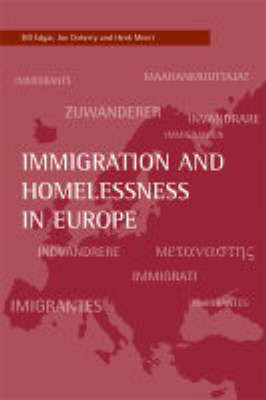FEANTSA
2 total works
The significant feature of homelessness in Europe over the past 25 years has been its persistence. Traditional policies have increasingly been found wanting in the light of the changed economic and demographic circumstances of the last quarter of the 20th century. A reappraisal of the nature of European homelessness by academics and practitioners demonstrates the need for the development of innovatory policies and practice that take account of these changed circumstances and explicitly address the current needs of Europe's homeless people.
This highly topical report provides a synthesis of reported developments in innovative service provision for homeless people in the member countries of the European Union. Setting their arguments within a context of changing welfare provision and welfare/housing regimes, the authors reappraise the nature of homelessness and its causes, chart the main dimensions of the composition of homeless populations and of policy instruments and examine in detail the nature and diversity of emerging innovative practices in the provision of services to the homeless of Europe. Select examples of innovative services for homeless people are provided in the comprehensive Appendix to the report.
The report draws on the 1998 national reports of the 15 correspondents of the European Observatory on Homelessness who conduct research on behalf of FEANTSA (the European Federation of National Organisations working with the Homeless). It provides a genuinely comprehensive coverage of EU member states and should stimulate debate regarding housing policy issues across Europe and encourage transnational cooperation between non-governmental organisations as well as act as a stimulus for further research.
In bringing together a wealth of material on policy and practice throughout Europe the report adds considerably to our knowledge of the dynamics of European homelessness and housing policy. Services for homeless people is therefore important reading for academics across Europe, practitioners in non-governmental organisations dealing with the homeless, housing agencies and government departments, and students of comparative housing studies.
The research of the European Observatory on Homelessness is supported financially by DG V of the European Commission.
This highly topical report provides a synthesis of reported developments in innovative service provision for homeless people in the member countries of the European Union. Setting their arguments within a context of changing welfare provision and welfare/housing regimes, the authors reappraise the nature of homelessness and its causes, chart the main dimensions of the composition of homeless populations and of policy instruments and examine in detail the nature and diversity of emerging innovative practices in the provision of services to the homeless of Europe. Select examples of innovative services for homeless people are provided in the comprehensive Appendix to the report.
The report draws on the 1998 national reports of the 15 correspondents of the European Observatory on Homelessness who conduct research on behalf of FEANTSA (the European Federation of National Organisations working with the Homeless). It provides a genuinely comprehensive coverage of EU member states and should stimulate debate regarding housing policy issues across Europe and encourage transnational cooperation between non-governmental organisations as well as act as a stimulus for further research.
In bringing together a wealth of material on policy and practice throughout Europe the report adds considerably to our knowledge of the dynamics of European homelessness and housing policy. Services for homeless people is therefore important reading for academics across Europe, practitioners in non-governmental organisations dealing with the homeless, housing agencies and government departments, and students of comparative housing studies.
The research of the European Observatory on Homelessness is supported financially by DG V of the European Commission.
Immigration and homelessness in Europe
by Bill Edgar, Joe Doherty, and Henk Meert
Published 23 November 2004
Drawing on the national reports of the correspondents of the European Observatory on Homelessness, the book provides a comparative analysis, identifying the commonalities and differences across fifteen member states of the EU. Specifically, the book assesses the impact of recent changes in European housing markets, especially their commodification and privatisation; examines how immigrants' vulnerability to homelessness is reflected in their legal status and explores the effect that growing numbers of migrants and their changing demographics have had on providers of homelessness services in Europe. Immigration and homelessness in Europe is essential reading for policy makers, service providers, social workers, researchers and students of housing and housing policy.

